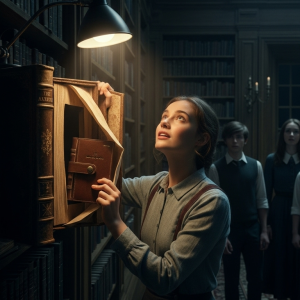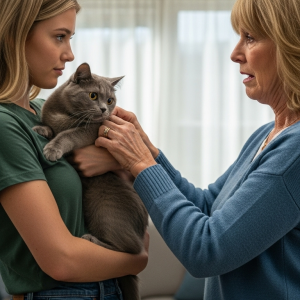Ben came home from the war carrying a silence his family couldn’t penetrate. He had the same steady blue eyes and easy smile, but something behind them had changed. He had seen the deserts of Afghanistan, seen the fragility of life and the chaotic indifference of violence, and it had left him with a quiet, desperate need to build something that healed instead of harmed.
His plan took the form of a pile of fragrant, freshly cut lumber delivered to the sprawling backyard of his family’s home. He was on a three-month leave, and he was using every penny of his combat pay to construct a small, well-insulated animal shelter.
His father, Frank, a man who measured the world in profit margins and practicalities, stood on the back porch, a coffee cup in his hand and a deep scowl on his face. “Look at this pile of lumber, Ben,” he said, his voice a low grumble. “I see a thousand dollars that could have gone to fixing the leaky roof. Compassion doesn’t stop the rain from coming in.”
Frank wasn’t a cruel man, but life had sanded all the soft edges off him. He believed in hard work, balanced budgets, and the cold, hard logic of the bottom line. Emotions, to him, were a luxury, a liability in the unforgiving arithmetic of life.
Ben’s older brother, Mark, arrived a few minutes later, his expensive suit looking out of place next to the rustic pile of wood. He was a successful real estate agent, a man who saw the world as a collection of properties to be valued, marketed, and sold. He looked at his brother’s project with undisguised horror.
“A dog kennel, Ben? Right here?” he said, gesturing with a hand that sported a gleaming designer watch. “Do you have any idea what that will do to the property value of this place? We’re talking a ten percent drop, easy. It’s financially irresponsible.”
Ben just kept unloading the wood from his truck, his movements calm and deliberate. He had anticipated this. He had been preparing his answer for months, in the quiet, lonely hours in a faraway barracks.
“Dad, Mark,” he said, finally turning to face them. “I spent the last year in a place where life was cheap. Where things were broken every single day. I just… I need to build something. Something that saves things instead of breaking them. Even if they’re just dog’s lives.” He looked at his father, his eyes pleading for an understanding he knew he wouldn’t get. “I need to feel like I’m putting something good back into the world.”
Frank just shook his head and walked back inside. Mark scoffed. “That’s very noble, little brother. Just remember that nobility doesn’t pay the mortgage.” Ben was left alone in the yard, the scent of sawdust and his family’s disapproval hanging heavy in the air.
A week into the build, Ben found him. He had been driving past the old industrial park on the edge of town, near the natural gas processing plant, when he saw a flash of movement. It was a dog, impossibly skinny, its ribs a harsh washboard beneath a coat of matted fur. One of its eyes was clouded over, a milky blue orb that gave its face a permanently skeptical look.
The dog was a survivor, wary and intelligent. It took Ben three days of patient, quiet visits with offerings of food before the dog would let him get close. On the third day, the dog, instead of running, took a piece of jerky from his outstretched hand and leaned, just for a second, against his leg. It was a silent, profound surrender. Ben named him Scout.
The reception at home was as cold as he’d expected. Frank saw another mouth to feed, another expense. Mark saw a mangy, one-eyed mutt that further degraded his childhood home’s curb appeal. “You can’t be serious, Ben,” he’d said with disgust. “You bring that… thing into this house?”
“He’ll stay in the shelter once it’s finished,” Ben said calmly, stroking Scout’s head. “He’s the first resident.”
Scout proved to be a remarkable animal. He was whip-smart, and his sense of smell was extraordinary. He would often stop during their walks, his nose twitching, detecting a rabbit or a raccoon from a hundred yards away. There was a quiet alertness about him, the ingrained caution of a creature who had spent his life on the edge.
Meanwhile, life in the suburban enclave went on. A new housing development was being built at the end of their street, and the constant thrum of heavy machinery was a new addition to the neighborhood’s soundtrack. No one thought anything of the vibrations that shook the ground day after day, disturbing the old, forgotten infrastructure that lay sleeping beneath their well-manicured lawns.
The night it happened was still and moonless. The whole family was sound asleep, the house a pocket of quiet in a sleeping world. Outside, in the nearly completed shelter, Scout was restless. He paced, a low growl rumbling in his chest. His sensitive nose, honed by a life of survival and a unique proximity to the nearby gas plant, had detected a familiar, dangerous scent. It was the smell of the chemical additive, ethyl mercaptan, the potent odor deliberately mixed into natural gas to make leaks detectable. But here, seeping up from the damp earth, it was a smell that didn’t belong.
His low growl escalated into a single, sharp bark. Then another. Soon, he was barking with a frantic, desperate intensity that was completely out of character.
In his second-floor bedroom, Frank groaned and rolled over, pulling a pillow over his head. “Stupid dog,” he mumbled into the darkness, his mind fuzzy with sleep. He was on the verge of drifting back off when a new sound, a violent, tearing noise, jolted him into a state of groggy awareness.
It was the sound of the screen on the back door being ripped to shreds.
Before he could even process what was happening, he heard the thunder of paws on the hardwood floor downstairs, then a frantic scrabbling on the carpeted stairs. His bedroom door, which had been left ajar, was thrust open. Scout, a dark shape in the gloom, launched himself onto the bed. He began digging at the blankets, scratching and pulling at Frank’s arm with an insistent, almost violent, panic.
“What the hell?” Frank roared, finally sitting bolt upright, his annoyance now turning to anger. “Get off, you damn…”
The words died in his throat. The moment he sat up, he smelled it. A thick, cloying, sickeningly sweet odor that was instantly recognizable. Gas. It was everywhere, so thick he could almost taste it.
A jolt of pure, cold adrenaline shot through him, vaporizing his sleepiness. “GET UP!” he screamed, his voice a raw sound of terror. “EVERYONE, GET UP AND GET OUT! NOW!” He shook his wife awake, grabbed his phone, and stumbled out of the room, shouting for Mark and Ben. They evacuated the house in a panicked, barefoot scramble, the four of them and a one-eyed dog huddled on the front lawn as Frank frantically dialed 911.
The arrival of the fire department was a maelstrom of flashing lights and professional urgency. Firefighters, clad in heavy gear, moved into the house, their handheld gas detectors chirping with an escalating, alarming frequency.
The Fire Chief, a grizzled, serious man named O’Malley, came over to where the family stood, wrapped in emergency blankets. “Everyone alright?” he asked, his eyes quickly assessing the situation. Frank, his heart still hammering, nodded.
“What happened? A leak from the stove?” Frank asked, his mind struggling to comprehend the magnitude of the danger they had just escaped.
O’Malley shook his head. “Worse,” he said grimly. “Much worse. The readings are highest in your basement. It’s not an appliance. We think it’s a main line leak, an old, corroded pipe under the property. The gas, being heavier than air, has been seeping through the soil and pooling in your basement for who knows how long.”
He looked at their house, then back at Frank, his expression grave. “I need you to understand how close you all came. The concentration levels in your basement were well into the explosive range. The pilot light on your furnace or water heater kicking on one more time… that would have been it. This house, and maybe the one next to it, would be a crater right now.”
A collective shudder went through the family. Mark’s face was ashen. Frank felt a dizzying wave of nausea. He looked down at Scout, who was sitting calmly by Ben’s feet, and then back at the Chief. “The dog,” Frank said, his voice barely a whisper. “He woke me up. He wouldn’t stop barking.”
Chief O’Malley’s gaze fell on the skinny, one-eyed dog. He knelt down, looking at the animal with a new level of respect. “He didn’t just bark, did he?” he asked, his eyes finding Ben’s. “A normal dog would bark at a strange smell. But the way you described his panic… that’s different. That’s recognition.”
Ben nodded slowly. “I found him living as a stray, out by the gas processing plant on the edge of town.”
The Chief’s eyes widened slightly with understanding. “Well, there you have it,” he said, standing up and looking at Frank and Mark. “That dog didn’t just wake you up because of a generic ‘bad smell.’ He smelled the ethyl mercaptan. He’s spent enough time around it to know exactly what that specific scent means. He knew it was dangerous.”
He gave Scout a final, appreciative pat. “That dog didn’t just save your family tonight,” he said, his words landing with the weight of a final verdict. “He saved your whole damn house. He’s a hero.”
The sun rose the next morning on a scene of quiet transformation. The gas company had dug up a large section of their lawn, exposing the rusted, crumbling pipe that had nearly been their tomb. The immediate danger was over, but the psychological aftershock was just beginning.
Frank and Mark sat at the kitchen table, the scent of fresh coffee mingling with the lingering, faint smell of gas. They didn’t speak. There were no words for the profound, humbling truth they now had to face. Their entire worldview, a rigid structure built on the foundation of financial prudence and a dismissal of sentiment, had been leveled as surely as their house would have been. The “wasted” money, the “soft-hearted” project, the “mangy” dog—these were the things that had saved them. Their own pragmatism, their hard-nosed logic, would have left them to die in their beds.
Ben came downstairs, ready to head out to work on his shelter, a quiet tension in his shoulders, expecting another argument, another lecture.
But it didn’t come. Frank stood up from the table. He didn’t speak. He simply walked to the hall closet, took out his old, worn tool belt, and strapped it around his waist. He picked up a hammer. Mark, his face pale and his eyes full of a new, unfamiliar humility, did the same, grabbing a saw.
They followed Ben out into the bright morning light. They didn’t offer an apology in words. They offered it in sweat and labor. Frank, who hadn’t swung a hammer for pleasure in thirty years, worked with a silent, focused intensity. Mark, who usually spent his Saturdays on the golf course closing deals, was on his knees, measuring boards, his expensive casual wear quickly covered in a layer of sawdust.
The quiet act of contrition was a more powerful apology than any words could have been. By noon, Mark was on the phone, not with a client, but with the manager of a local lumber yard, using his skills of persuasion to arrange a massive donation of materials for the shelter. “It’s for a hero,” he’d said into the phone, his eyes on Scout, who was dozing happily in a patch of sun.
The story, as stories like this do, spread through the town. The local news picked it up: “Hero Dog, Rescued by Soldier, Saves Family From Explosion.” Donations began to pour in. Volunteers showed up on weekends to help paint and build. Ben’s small, personal project had become a beloved community cause.
On the day before Ben’s leave was over, they hammered in the last nail. The shelter was finished, far grander and more beautiful than he had ever imagined. His father and brother stood beside him, their faces tired but proud. The rift between them had been repaired, the foundation of their family rebuilt with stronger stuff than before: respect, humility, and a shared understanding of what truly holds value.
“You built something good here, son,” Frank said, his voice thick with an emotion Ben had rarely heard. “Something that matters.”
Ben looked at the shelter, then at his father and brother, and finally at the one-eyed dog leaning against his leg. He hadn’t just built a safe haven for a few lost animals. He had built a bridge back to his own family. He had come home from the war searching for peace, and in an act of selfless kindness, he had found it, right here in his own backyard.




